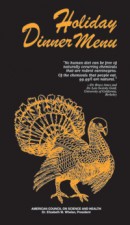 The focus of the ACSH holiday menu is on "carcinogens," defined here as chemicals, either natural or synthetic, that cause cancer in rodents when consumed in large amounts. A related topic, however, is that of "poisons," technically known as toxicants. Just as it is scientifically unwarranted to believe that the food supply is free of natural rodent carcinogens and mutagens, it is equally unrealistic to equate "natural" with safe. Foods abound in natural chemicals that are toxic or potentially toxic because all chemicals will be toxic at some dose. Toxicologists have confirmed that food naturally contains a myriad of chemicals traditionally thought of as "poisons." Potatoes contain solanine, arsenic, and chaconine. Lima beans contain hydrogen cyanide, a classic suicide substance. Carrots contain carototoxin, a nerve poison. And nutmeg, black pepper, and carrots all contain the hallucinogenic compound myristicin. Moreover, all chemicals, whether natural or synthetic, are potential toxicants at high doses but are perfectly safe when consumed in low doses. Take common table salt, for example: This everyday chemical, when consumed in excess, can cause elevations in blood pressure in sensitive individuals; a couple of tablespoonsful can kill a small child. Selenium, a mineral essential in the human diet, can cause nausea and nerve changes when chronically consumed in excess. The familiar stimulant caffeine is also a toxicant if consumed in high doses (say, 50 to 100 cups of coffee per day). Supplements of the essential mineral iron all too often cause poisoning in children. When it comes to toxicants in the diet natural or synthetic the dose makes the poison. ACSH Holiday Dinner Menu
The focus of the ACSH holiday menu is on "carcinogens," defined here as chemicals, either natural or synthetic, that cause cancer in rodents when consumed in large amounts. A related topic, however, is that of "poisons," technically known as toxicants. Just as it is scientifically unwarranted to believe that the food supply is free of natural rodent carcinogens and mutagens, it is equally unrealistic to equate "natural" with safe. Foods abound in natural chemicals that are toxic or potentially toxic because all chemicals will be toxic at some dose. Toxicologists have confirmed that food naturally contains a myriad of chemicals traditionally thought of as "poisons." Potatoes contain solanine, arsenic, and chaconine. Lima beans contain hydrogen cyanide, a classic suicide substance. Carrots contain carototoxin, a nerve poison. And nutmeg, black pepper, and carrots all contain the hallucinogenic compound myristicin. Moreover, all chemicals, whether natural or synthetic, are potential toxicants at high doses but are perfectly safe when consumed in low doses. Take common table salt, for example: This everyday chemical, when consumed in excess, can cause elevations in blood pressure in sensitive individuals; a couple of tablespoonsful can kill a small child. Selenium, a mineral essential in the human diet, can cause nausea and nerve changes when chronically consumed in excess. The familiar stimulant caffeine is also a toxicant if consumed in high doses (say, 50 to 100 cups of coffee per day). Supplements of the essential mineral iron all too often cause poisoning in children. When it comes to toxicants in the diet natural or synthetic the dose makes the poison. ACSH Holiday Dinner Menu
Enjoy your holiday dinner chemicals and all!
All chemicals, whether natural or synthetic, are potential toxicants at high doses but are perfectly safe when consumed in low doses.


